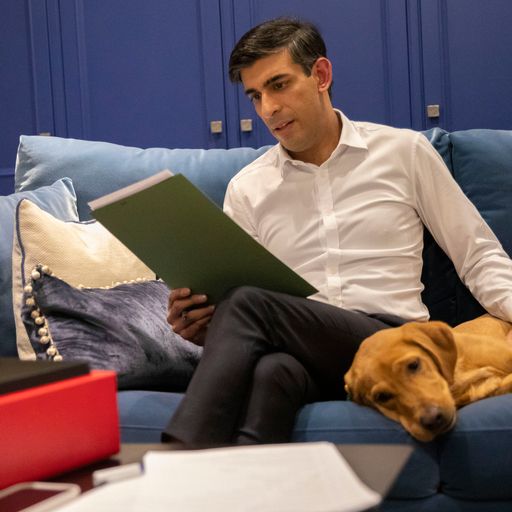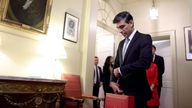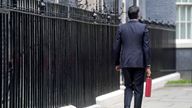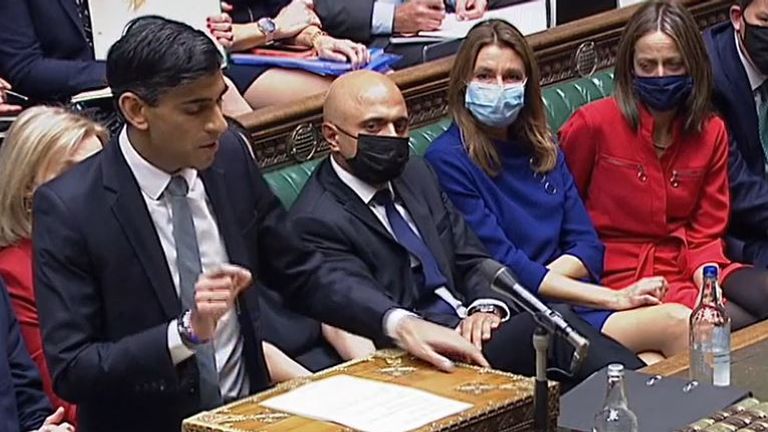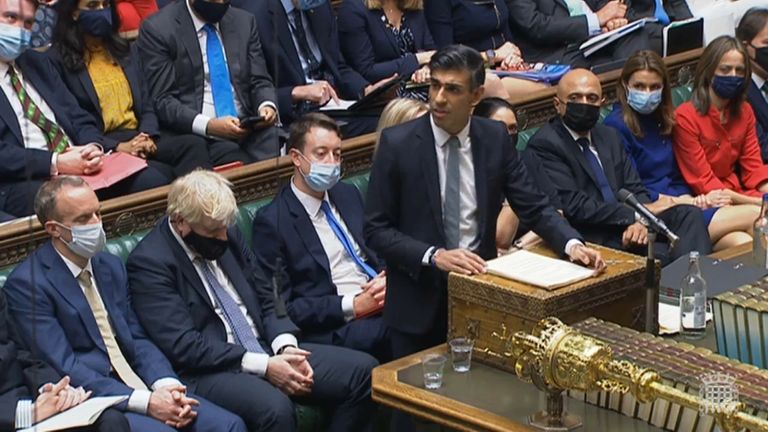Chancellor unveils tax cuts and benefits boost as he warns of ‘challenging’ months ahead
Chancellor Rishi Sunak has set out a series of tax cuts and a boost to benefits to help Britons with the cost of living, as he warned of “challenging” months ahead due to the continuing COVID pandemic and rising inflation.
In his budget statement to the House of Commons, Mr Sunak promised plans to build “a stronger economy for the British people” after the coronavirus crisis.
He also acknowledged that households could face a squeeze as the UK economy continues to recover from the impact of COVID.
The chancellor revealed the Office for Budget Responsibility (OBR) expects the CPI rate of inflation to average 4% over the next year.
Will you be better or worse off? Budget announcements and analysis as it happened
Benefits boost as Sunak lowers Universal Credit taper rate
Promising to provide “help for working families with the cost of living”, Mr Sunak announced he would lower the taper rate of Universal Credit from 63% to 55%.
This means, for every extra £1 someone earns, their Universal Credit will be reduced by 55p rather than 63p.
Mr Sunak claimed the move, which will be implemented no later than 1 December, would see nearly two million families keep, on average, an extra £1,000 a year.
But critics said it only went part way to reducing the impact of the chancellor’s previous decision to cut a pandemic-induced £20 per week uplift to welfare payments.
In pre-budget announcements, the Treasury had already confirmed an increase to the national living wage to £9.50 an hour and the unfreezing of public sector pay.
Alcohol, fuel, flights, banks and business tax cuts
In a series of tax changes, Mr Sunak announced a new post-Brexit system of alcohol duties, including a lower rate of tax on draught beer and cider to boost pubs.
The new “more rational” system of levies will also see sparkling wines, such as prosecco, pay the same duty as still wines of equivalent strength.
With petrol prices having hit a record high across the UK, the chancellor cancelled a planned rise in fuel duty.
And Mr Sunak also sought to support high streets with a new year-long 50% business rates discount for businesses in the retail, hospitality and leisure sectors.
The chancellor confirmed he would slash the surcharge on bank profits from 8% to 3%.
In a move that brought condemnation from environmental groups – and in the week before the COP26 climate change summit in Glasgow – the chancellor revealed a new lower rate of Air Passenger Duty for domestic flights between England, Scotland, Wales and Northern Ireland.
Tax burden highest since 1950s while spending at 1970s levels
Mr Sunak’s lowering of taxes might help ease the uncomfort felt by some Conservative MPs over the manifesto-busting hike in National Insurance contributions announced by the chancellor last month.
In their latest economic and fiscal outlook, the OBR stated that the tax burden was at its highest since the early 1950s.
They said that Mr Sunak had now raised taxes by more this year than in any single year since Norman Lamont and Ken Clarke’s two 1993 budgets in the aftermath of Black Wednesday.
The OBR also said that public spending was set for its largest sustained share of GDP since the late 1970s.
‘Largest increase this century’ in Whitehall spending
As he revealed the results of his spending review to accompany the budget, Mr Sunak promised “the largest increase this century” in total spending across government departments.
The £150bn increase over this parliament, until 2024, would include “a real terms rise in overall spending for every single department” and also saw Mr Sunak confirm extra money for the NHS, courts, prisons and the probation services, local transport, childcare and parenting programmes, science funding and housing.
But, as he outlined the current state of the economy, the chancellor said he was keeping a cash reserve to “protect ourselves against economic risks”.
“That is the responsible decision at a time of increasing global economic uncertainty, when our public finances are twice as sensitive to changes in interest rates as they were before the pandemic and six times as sensitive as they were before the financial crisis,” the chancellor said.
“Just a one percentage point increase in inflation and interest rates would cost us around £23bn.”
New spending rules as Sunak warns of interest rates rise
Mr Sunak set out new government spending rules that he said would keep the public finances “on the path of discipline and responsibility” with his new rules.
These include underlying public sector net debt – excluding the impact of the Bank of England – falling as a percentage of GDP.
And Mr Sunak also said that, in normal times, the government should only borrow to invest in “future growth and prosperity”.
“Everyday spending must be paid for through taxation,” the chancellor said, as he set out action to pay back the multi-billion pound spending during the COVID crisis.
Mr Sunak said his budget “does not draw a line under COVID” as he warned of “challenging months ahead” and encouraged “everyone eligible to get their booster jabs right away”.
But the chancellor added his fiscal package “does begin the work of preparing for a new economy” after the coronavirus crisis.
UK economy to grow ‘quicker’ than expected
The OBR now expects the UK’s economic recovery from the COVID pandemic to be “quicker” than previously thought, Mr Sunak told MPs, with growth revised up from 4% to 6.5% for this year.
In 2022, the OBR expects the UK economy to grow by 6%, and 2.1%, 1.3% and 1.6% over the following three years.
And they have also revised down their estimates of long-term “scarring” to the UK economy of the COVID crisis.
The chancellor also told the Commons that the OBR expects a lesser peak of unemployment, of 5.2%, which means “over two million fewer people out of work than previously feared”.
Wednesday’s statement was the third budget delivered by Mr Sunak as chancellor and the second of this year, following his statement in March.
Labour accuse Sunak of ‘living in a parallel universe’
Labour leader Sir Keir Starmer was unable to respond to Mr Sunak’s budget in the House of Commons after earlier testing positive for COVID.
In his place, Labour shadow chancellor Rachel Reeves accused Mr Sunak of “living in a parallel universe”.
“Families struggling with a cost-of-living crisis, businesses hit by a supply chain crisis, those who rely on our schools and hospitals and our police – they won’t recognise the world the chancellor is describing,” she told MPs.
“The chancellor in this budget has decided to cut taxes for banks. So at least the bankers on short-haul flights sipping champagne will be cheering this budget today.”
On the Universal Credit changes, Ms Reeves added: “After taking £6bn out of the pockets of some of the poorest people in this country, he is expecting them to cheer today at being given £2bn to compensate.”
